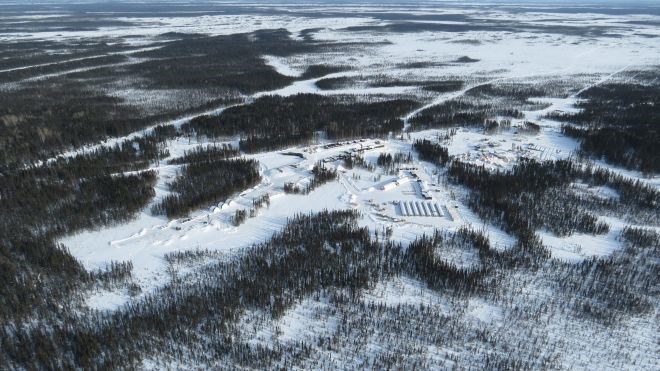The Ford government is determined to throw some fuel on the Ring of Fire.
But how mining development will unfold in the Far North still appears to be a work in progress.
In his Nov. 16 Fall Economic Statement, Finance Minister Vic Fedeli reaffirmed the government’s commitment to cut regulatory red tape that’s hindered advancement of the projects in the James Bay region.
Fedeli spoke about extending prosperity to “every corner of our province,” and clearing the hurdles to develop the Ring of Fire.
“No more platitudes, no more delays. Instead, our government will work directly with our First Nations partners in order to realize the long-awaited benefits.”
A new “special mining working group” will be tasked with streamlining the regulatory approvals process and attracting major investments to Ontario.
The Ring of Fire Secretariat, a Crown agency left over from the previous Wynne government, remains in place, but it’s unclear whether the negotiating format to consult with area First Nations close to the mineral deposits – known as Regional Framework Agreement process – will be restarted.
“The Ring of Fire is a top priority for our government. We are committed to cutting red tape and ending delays to ensure the Ring of Fire moves forward in a timely manner,” said Sydney Stonier, press secretary in Minister of Energy, Northern Development and Mines Greg Rickford’s office, in an email.
“Our government understands the incredible potential that exists in our North and we are making sure that the North is open for business. The Ring of Fire Secretariat continues to exist within the ministry and will remain dedicated to Ring of Fire planning.”
Some Indigenous communities in the Far North recently voiced their frustration over the lack of dialogue with Queen’s Park and the premier since the June provincial election.
The Regional Framework Agreement was a process started by the Wynne government in 2014 to work with the nine communities of the Matawa First Nations on how industrial development would take place, and how they would participate.
But the confidential talks dragged on, without results, and the process seemed to lose steam as the Wynne government narrowed its focus on those communities deemed more welcoming to mineral development.
The new government’s philosophy is work with “willing partners” to advance the mine projects, said Stonier.
“Ontario takes the Crown’s duty to consult very seriously. The government will continue to build relationships as we work with Indigenous partners and communities to pursue economic development opportunities in Northern Ontario.”
Whether the Ontario Northland Transportation Commission, headquartered in Fedeli’s hometown of North Bay, plays a part in advancing the Ring of Fire is too premature, answered Stonier, since the government is only at the planning stages of the access roads.
“It is too soon to determine any role for the Ontario Northland Transportation Commission related to transportation in the Ring of Fire. Currently, work is underway on the necessary planning and approvals to construct an all-season, multi-purpose road to Marten Falls First Nation and a supply road from Webequie First Nation to the Ring of Fire region. We will be working with all partners to consider future opportunities to extend this network into the Ring of Fire.”
Fedeli said the government will make good on its election campaign promise to introduce resource revenue sharing to create a “win-win situation for Northern towns and Indigenous communities and mining, forestry and aggregates companies.”
How that formula will work remains unclear but the government intends to do some outreach.
“One of the government’s commitments is exploring ways to encourage development of natural resources, by helping Northern towns and Indigenous communities share in the benefits of resource development from mining, forestry and aggregates,” said Stonier.
“Ontario looks forward to collaborating with partners to move forward on resource revenue sharing – to connect First Nations to the benefits of local development and regional economies.”
For Northern Ontario, Fedeli said to expect funding for Trans-Canada Highway improvements, expansion of natural gas and broadband network to rural areas, a review of the North’s transportation needs by way of passenger rail and bus service, and a second look at the controversial Far North Act passed by the McGuinty government in 2010.
Fedeli also said the Ford government will not stand in the way of the expansion of oil pipelines through Ontario to the East Coast, if it furthers national interests.
“It’s time we worked together as part of one great nation and get the pipelines built.”




